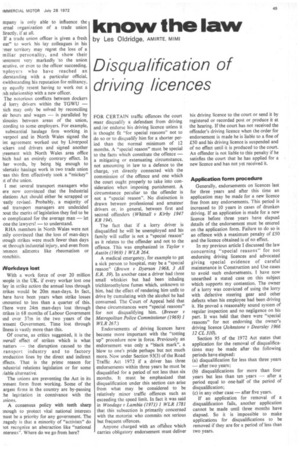know the law
Page 51

If you've noticed an error in this article please click here to report it so we can fix it.
by Les Oldridge, AMIRTE, MIMI
Disqualification of driving licences
FOR CERTAIN traffic offences the court must disqualify a defendant from driving and /or endorse his driving licence unless it is thought fit "for special reasons" not to do so or to disqualify him for a shorter period than the normal minimum of 12 months. A "special reason" must be special to the facts which constitute the offence — a mitigating or extenuating circumstance, not amounting in law to a defence to the charge, yet directly connected with the commission of the offence and one which the court ought properly to take into consideration when imposing punishment. A circumstance peculiar to the offender is not a "special reason". No distinction is drawn between professional and amateur drivers or, in general, between first and second offenders (Whittall v Kirby 1947 KB 194).
The fact that if a -lorry driver is disqualified he will be unemployed and his family will suffer is not a "special reason" as it relates to the offender and not to the offence. This was emphasized in Taylor v Austin (1969) 1 WLR 264.
A medical emergency, for example to get a sick person to hospital, may be a "special reason" (Brown v Dyerson 1968, 3 All E.R. 39). In another case.a driver had three small whiskies but had been inhaling trichloroethylene fumes which, unknown to him, had the effect of rendering him unfit to drive by cumulating with the alcohol he had consumed. The Court of Appeal held that these circumstances were "special reasons" for not disqualifying him. (Brewer v Metropolitan Police Commissioner (1969) 1 WLR 267.) Endorsements of driving licences have become more important with the "totting up" procedure now in force. Previously an endorsement was only a "black mark", a blow to one's pride perhaps but not much more. Now under Section 93(3) of the Road Traffic Act 1972 if a driver has three endorsements within three years he must be disqualified for a period of not less than six months. It must be emphasized that disqualification under this section can arise from what may be considered to be relatively minor traffic offences such as exceeding the speed limit. In fact it was said in Woodage v Lambia (1971) 1 WLR 1781 that this subsection is primarily concerned with the motorist who commits not serious but frequent offences.
Anyone charged with an offetce which carries obligatory endorsement must deliver his driving licence to the court or send it by registered or recorded post or produce it at the hearing. If the court has not received the offender's driving licence when the order for endorsement is made he is liable to a fine of £50 and his driving licence is suspended and of no effect until it is produced to the court. An offender is not liable to this penalty if he satisfies the court that he has applied for a new licence and has not yet received it.
Application form procedure Generally, endorsements on licences last for three years and after this time an application may be made for a new licence free from any endorsements. This period is increased to 10 years in cases of drunken driving. If an application is made for a new licence before three years have elapsed details of the endorsement must be entered on the application form. Failure to do so is an offence with a maximum penalty of £50 and the licence obtained is of no effect.
In my previous article I discussed the law concerning "special reasons" for not endorsing driving licences and advocated giving special evidence of careful maintenance in Construction and Use cases to avoid such endorsements. I have now unearthed a stated case on this subject which supports my contention. The owner of a lorry was convicted of using the lorry with defective steering gear and other defects when his employee had been driving it. He proved a reasonably sound system of regular inspection and no negligence on his part. It was held that there were "special reasons" for not endorsing the owner's driving licence (Johnstone v Dearsley 1966 12 CL 310).
Section 95 of the 1972 Act states that application for the removal of disqualifications may be made after the following periods have elapsed: (a) disqualification for less than three years — after two years; (b) disqualifications for more than four years but less than ten years — after a period equal to one-half of the period of disqualification; (c) in any other case — after five years.
If an application for removal of a disqualification fails, another application cannot be made until three months have elapsed. So it is impossible to make applications for disqualifications to be removed if they are for a period of less than two years.




























































































